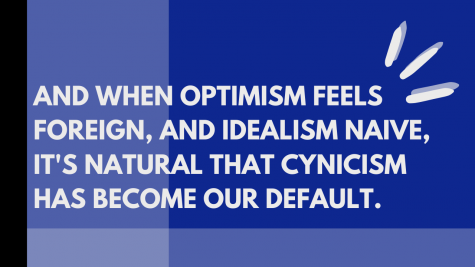Lessons and legacies of Ruth Bader Ginsburg
We need to embrace the urgency to eliminate today’s rampant cynicism and idealism
September 20, 2020
Fight for the things that you care about, but do it in a way that will lead others to join you.
Powerful words by the late Supreme Court Justice Ruth Bader Ginsburg are even more potent after her death on Sept. 18, 2020, especially amid the worsening political, economic and social discord of America today. Ginsburg was an American feminist icon, an inspiration to women around the world — her list of accomplishments are endless, and her eloquence, character and poise were admired by millions.
And yet, it’s heartbreaking that her passing can’t be mourned without being supplemented by (you guessed it) another partisan battle. Ginsburg’s death allows President Donald Trump an opportunity to replace her, entrenching “a 6-3 conservative majority on the bench — and conceivably to influence the presidential election in November.” Senate Republican majority leader Mitch McConnell announced that a replacement would be picked promptly, while Joe Biden, the Democratic presidential nominee, said that the winner of the presidential election should be responsible for the decision.
Ginsburg’s passing and the emergence of yet another worrisome political battle that is bound to impact Americans — a potential conservative majority may correspond to diminished rights, for women and minorities especially — is yet another item to add to our list of things that have made 2020, well, suck.
It is natural that the MVHS community and beyond has engaged in countless conversations embedded with cynicism — the electric orange skies signaling worsening climate change, the seven months and counting of quarantine, the challenges brought forth by online distance learning all provide ample opportunities for complaints, and rightfully so. For many, the world constantly feels as if it’s crashing down, and silver linings often seem scarce, if not invisible altogether. And when optimism feels foreign, and idealism naive, it’s natural that cynicism has become our default.

However, cynicism is dangerous. It promotes a give-up attitude, and with the abundance of challenges 2020 has granted us, giving up is the last thing we should do. If we don’t believe in a better future, we can’t make it a reality.
In addition to cynicism, 2020 has also inspired a creative new branch of idealism, in which the problems of 2020 are implied to be isolated to 2020. Rhetoric such as “2020 is not it” and “I can’t wait until next year” can be humorous and at times comforting. Yet, its implications are harmful because a year (time is a social construct!) is not the problem. The problem is in our society, our political institutions and our passivity. And as much as we’d like it to be, ‘Welcome 2021!’ is not synonymous with ‘Farewell COVID-19.’ ‘Happy New Year!’ is not synonymous with ‘Goodbye climate change.’ The clock striking midnight on New Years’ Eve is not synonymous with the disappearance of racial injustice.
We can’t keep switching back and forth between dismal, passive cynicism and, frankly ridiculous, targeting of 2020 with the idealistic hope that Jan. 1 will bring us sunshine and rainbows. Being cynical puts progress at a standstill, and blatant disregard for our distressing circumstances does the same. So, instead of looking back at everything that’s gone wrong this year or daydreaming about everything getting better next year (without actually doing anything to aid this), we need to — as cliche as it sounds — focus and live in the present. And not just live, but act in the present.
Silver linings seem to dissipate as the days pass at alarming speed, but resilience and action need to be our best friends. Whether it be voting in the local and presidential elections, fighting for racial justice within our communities or simply maximizing our productivity despite online distance learning, we need to deprave ourselves of the passive cynicism and unrealistic idealism holding us back.
As Ginsburg said, “fight for the things that you care about, but do it in a way that will lead others to join you.”
We only have three full months of 2020 left. Let’s make them count — Ginsburg would’ve wanted it.


















